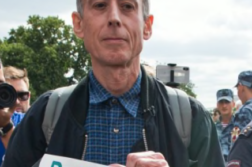TWENTY YEARS after Mongolia dismantled Communism, changed to a free market economy, and installed elections, the country is ranked by the Economic Intelligence Report (EIR) on a democracy scale as 69th out of 167 countries. Mongolia is a democratic beacon surrounded by authoritarian and hybrid regimes. Though not ranked as a “full democracy” as yet, Mongolia shares its category of “flawed democracy” with several developed countries, such as France and Italy. According to the Freedom House Index, the country has been rated “free” for the past several years, though problems have been noted in the area of gender, as women have had scant representation in parliament. However, the reinstatement of a quota system this year to twenty percent for electing women in parliament ushered in twelve percent representation in the 2012 parliamentary elections on June 28. The new parliament is in the process of being established.
Despite these impressive gains, the GLBT community still faces a great deal of repression in Mongolia. Freedom House detailed the difficulties the country’s first GLBT non-governmental organization (NGO) faced when trying to register with the government. The LGBT Centre—the first human rights-based organization of its kind in the country, founded in 2007—was denied governmental registration for two years, as its name was not seen as “Mongolian” in nature.





